Astrocyte Antibodies: Key Insights in Neuroimmunology
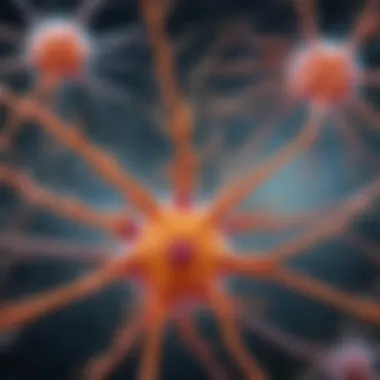
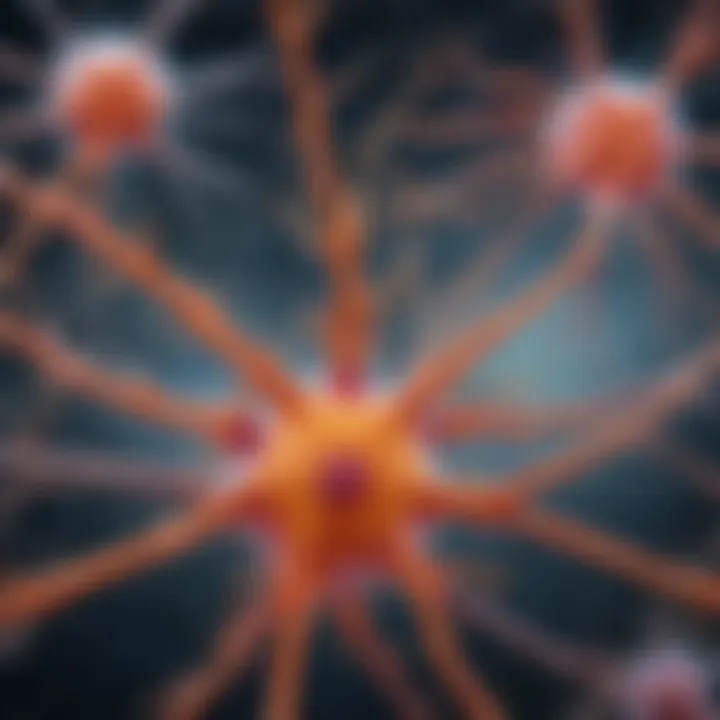
Intro
Astrocytes are a type of glial cell in the central nervous system, playing a crucial role in maintaining homeostasis, supporting neurons, and modulating synaptic activity. In recent years, astrocyte antibodies have emerged as significant contributors to various neurological disorders. Their presence has been linked to conditions such as autoimmune encephalitis and multiple sclerosis, raising questions about their origins, mechanisms of action, and implications for future therapeutic strategies.
Understanding these antibodies can unveil new pathways for research and treatment, making it essential to explore their effects on neuroimmunology.
Research Overview
Summary of Key Findings
Astrocyte antibodies can alter astrocyte function, leading to neuroinflammation and neuronal dysfunction. In autoimmune encephalitis, for example, these antibodies can disrupt the blood-brain barrier, contribute to synaptic impairment, and facilitate inflammatory responses that exacerbate neuronal injury. Several studies have demonstrated the association of these antibodies with clinical outcomes, suggesting their potential as biomarkers for diagnosis or disease progression.
Research Objectives and Hypotheses
The primary objective of this article is to elucidate the role of astrocyte antibodies in neuroimmunological disorders. We aim to establish the following hypotheses:
- Astrocyte antibodies directly influence the progression of neurological conditions.
- The detection of these antibodies can serve as a diagnostic tool in autoimmune encephalitis and multiple sclerosis.
- Targeting astrocyte-related pathways may present a novel therapeutic avenue for treating neurological disorders.
Methodology
Study Design and Approach
This review article employs a comprehensive literature analysis to synthesize existing research on astrocyte antibodies and their implications in neurological conditions. By examining peer-reviewed articles, clinical studies, and foundational research, we assess the current understanding of these antibodies’ role and potential impact.
Data Collection Techniques
Data collection involved searching databases like PubMed and Google Scholar for relevant studies. Keywords such as "astrocyte antibodies," "neuroimmunology," "autoimmune encephalitis," and "multiple sclerosis" were crucial in identifying pertinent literature. We focused on both retrospective and prospective studies that reported on the immunological mechanisms and clinical significance of astrocyte antibodies.
"Astrocyte antibodies are not mere bystanders in neurological diseases; they interact uniquely with inflammation and neuronal health."
Through this investigative framework, we seek to provide a detailed understanding of the implications of astrocyte antibodies in neuroimmunology.
Preamble to Astrocyte Antibodies
The study of astrocyte antibodies plays a crucial role in the intersection of neuroimmunology and neuroscience. Understanding these antibodies is not merely an academic pursuit; it holds significant implications for diagnosing and treating neurological disorders. Astrocytes, a type of glial cell, contribute to maintaining homeostasis, supporting neurons, and forming the blood-brain barrier. The production of specific antibodies against these cells suggests a potential pathophysiological mechanism in various diseases, particularly autoimmune disorders such as autoimmune encephalitis.
When we delve into this topic, we uncover important benefits. Recognizing the role of astrocyte antibodies can lead to earlier diagnosis and more tailored therapeutic approaches, thereby improving patient outcomes. As the landscape of neuroimmunology continues to evolve, the nuances of astrocyte involvement in immune responses become increasingly apparent.
Astrocyte antibodies could also serve as biomarkers for disease progression. Monitoring these biomarkers may enable researchers and clinicians to track the effectiveness of therapeutic interventions. Furthermore, this knowledge can guide the development of targeted treatments that address the underlying mechanisms of astrocyte-related pathologies.
Definition of Astrocyte Antibodies
Astrocyte antibodies are immune proteins that mistakenly target astrocytes in the central nervous system. These antibodies can disrupt normal astrocytic function and contribute to neuroinflammation and neuronal damage. The presence of these antibodies in the bloodstream or cerebrospinal fluid often correlates with specific neurological disorders.
The recognition of astrocyte antibodies as important diagnostic tools has grown. For instance, in cases of autoimmune encephalitis, the identification of these antibodies assists in confirming the diagnosis and tailoring the treatment accordingly.
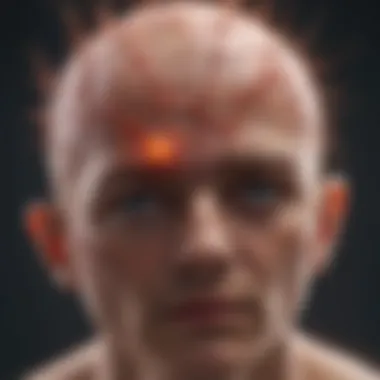
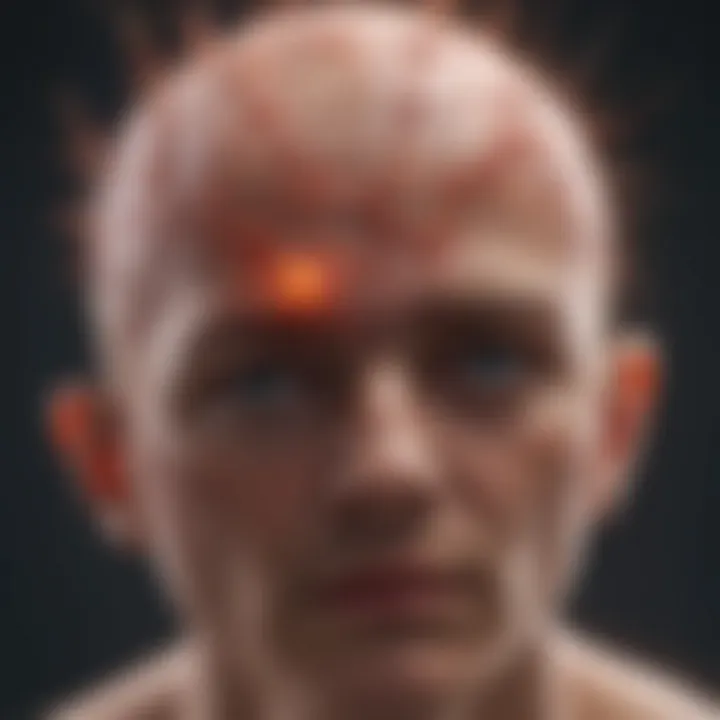
Historical Context and Discovery
The discovery of astrocyte antibodies is relatively recent in the field of neuroimmunology. Initial observations of the immune system's impact on the central nervous system spurred a deeper investigation into the role of astrocytes. Early studies indicated that autoimmune conditions could lead to neurological symptoms, prompting researchers to explore whether specific antibodies were involved.
As research advanced, scientists began to identify various antibodies targeting astrocytic structures. One of the pivotal moments was the recognition of these antibodies in patients with autoimmune encephalitis. This marked a significant shift in understanding the immune system's engagement with the nervous system and highlighted the importance of astrocytes in these processes.
Overall, the exploration of astrocyte antibodies has evolved from a nascent understanding to a vital area of study within neuroimmunology, revealing valuable insight into the complexities of autoimmune disorders and their influence on brain health.
Astrocyte Biology
Astrocyte biology is essential to understanding the broader implications of astrocyte antibodies in neuroimmunology. Astrocytes are a type of glial cell found in the central nervous system (CNS). Their functions are varied and complex, contributing to brain homeostasis, neuronal support, and immune responses. The study of astrocyte biology elucidates how astrocyte antibodies interact with their functions and the potential pathological outcomes that may arise from these interactions.
Structure and Function of Astrocytes
Astrocytes exhibit a unique structure that is well-suited for their diverse roles in the CNS. They possess a star-like shape with numerous processes that extend to neurons, blood vessels, and the extracellular matrix. This morphology enables them to create a supportive network around neurons, facilitating communication and nutrient exchange.
Astrocytes perform several critical functions:
- Supporting Neurons: They provide structural support to neurons, helping to maintain the overall architecture of the CNS.
- Regulating Ion Balance: Astrocytes help in maintaining ion homeostasis by regulating concentrations of potassium and calcium in the extracellular environment.
- Nutrient Supply: They transport glucose from blood vessels to neurons, ensuring energy availability, especially during high metabolic demand.
- Neurotransmitter Regulation: Astrocytes take up excess neurotransmitters, such as glutamate, which prevents excitotoxicity and ensures neuronal health.
- Barrier Function: They contribute to the blood-brain barrier, regulating the passage of substances between the bloodstream and the brain.
The disruption of any of these functions can lead to neurological disorders. For instance, dysregulation in ionic balance can contribute to seizure activity, while impaired neurotransmitter uptake may be linked to mood disorders.
Role of Astrocytes in the CNS
In the central nervous system, astrocytes play multifaceted roles that go beyond mere support for neurons. They are active participants in neuroinflammatory processes, responding to injury and promoting repair. One significant aspect of their role involves intercellular communication. Astrocytes can release various signaling molecules that influence neuronal activity and modulate synaptic transmission.
Moreover, astrocytes are pivotal in maintaining homeostasis during normal and pathological conditions. They respond to changes in neuronal activity and can undergo alterations in their morphology and function in response to various stimuli, such as stress or injury. This plasticity suggests they can adapt to changing environments, which is crucial during neuroinflammatory conditions or in response to astrocyte antibodies.
- Signaling Mediators: Astrocytes release gliotransmitters, which can act on nearby neurons and influence their excitability.
- Response to Injury: In the event of CNS injury, astrocytes become reactive. This process can be protective but may also lead to detrimental scarring that impairs recovery.
- Link to Immune Response: Astrocytes can participate in the immune response by secreting cytokines and chemokines, thus integrating neuronal function with immune signaling.
The implications of these activities highlight the importance of understanding astrocyte biology, particularly when investigating the roles of astrocyte antibodies in disease contexts. A comprehensive grasp of astrocyte function allows for better insight into their involvement in the pathogenesis of various neurological disorders.
Autoimmune Encephalitis and Astrocyte Antibodies
Understanding autoimmune encephalitis is crucial when discussing astrocyte antibodies. This condition highlights the intersection of the immune system and the nervous system, making it a focal point in neuroimmunology. Autoimmune encephalitis involves the immune system mistakenly attacking the brain, leading to inflammation. Astrocyte antibodies are known to play a role in some forms of this disease, influencing both diagnosis and treatment strategies. Thus, delving into the relationship between astrocytic antibodies and autoimmune encephalitis will illuminate their significance in an array of neurological disorders.
Overview of Autoimmune Encephalitis
Autoimmune encephalitis refers to a condition where the immune system targets neuronal antigens, resulting in neurological symptoms. Patients may present with psychiatric symptoms, seizures, and cognitive dysfunction. The pathophysiology is complex, often involving specific antibodies that identify the immune response. Common forms of autoimmune encephalitis involve antibodies such as NMDA receptor antibodies and voltage-gated potassium channel antibodies. This inflammation can severely affect the quality of life and often requires prompt recognition and treatment.
Astrocytic Antibodies in Autoimmune Disorders
Astrocytic antibodies have gained recognition for their role in several autoimmune disorders. Their presence may indicate a disrupted neuroimmune interaction that contributes to illness. Research has identified specific astrocyte antibodies associated with conditions like anti-AQP4 antibody disease, which significantly impacts the central nervous system.
The implications of these antibodies stretch beyond purely diagnostic functions. They can provide insights into the underlying mechanisms of disease, offering avenues for understanding how autoimmune processes affect astrocyte function and overall brain health. This understanding is crucial, as astrocytes support neuronal function and maintain homeostasis in the central nervous system.
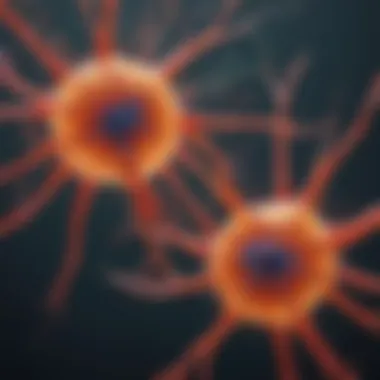
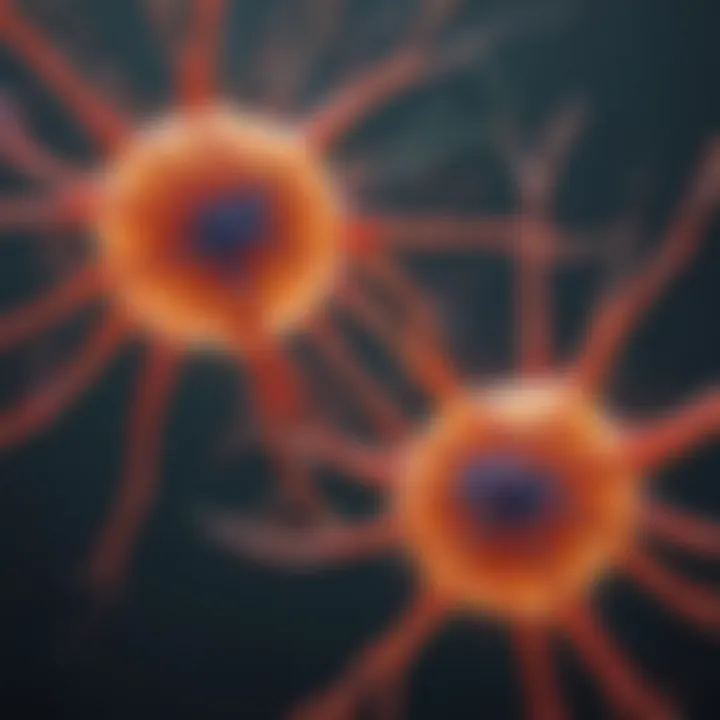
Clinical Implications of Detection
The detection of astrocyte antibodies carries significant clinical implications. Accurate diagnosis can facilitate tailored treatment plans that address the specific autoimmune activity in the brain. For example, early detection can lead to early intervention with corticosteroids or immunotherapy, which can mitigate long-term damage. Moreover, as healthcare continues to prioritize personalized medicine, the presence of these antibodies may guide future therapeutic strategies.
Understanding the nuanced relationship between astrocyte antibodies and autoimmune encephalitis can enhance both diagnostic and treatment approaches, refining our strategies for managing these complex disorders.
Link Between Astrocyte Antibodies and Neurological Disorders
The intersection of astrocyte antibodies and neurological disorders represents a fertile ground for research and understanding. These antibodies play a significant role in various disorders, influencing the pathology and progression of diseases. This relationship underscores the importance of studying astrocytes not just as supporting cells but as active participants in the central nervous system (CNS) pathology. The presence of astrocyte antibodies in patients has been correlated with specific neuroimmunological conditions, indicating their potential as biomarkers and targets for therapeutic interventions.
Multiple Sclerosis and Astrocytic Interactions
Multiple sclerosis (MS) is a complex autoimmune disorder characterized by demyelination and neurodegeneration within the CNS. Astrocytes are implicated in this disease due to their interactions with both neurons and immune cells. Research suggests that astrocyte antibodies may exacerbate the inflammatory environment. These antibodies can disrupt the delicate balance needed for neuronal health, potentially making astrocytes less effective at repairing damage.
The presence of astrocyte antibodies raises questions about their role in MS progression. Studies indicate that a specific subset of patients exhibit these antibodies, leading to more severe symptoms and poorer outcomes. This suggests that recognizing astrocyte antibodies could help tailor more individualized treatment strategies.
Neurodegenerative Conditions and Inflammation
Neurodegenerative diseases, such as Alzheimer’s and Parkinson’s, often involve chronic neuroinflammation. This inflammation may trigger or worsen the production of astrocyte antibodies, creating a vicious cycle that further damages neuronal integrity. Astrocytes, in an attempt to protect the CNS, release inflammatory mediators. However, when dysregulated, these responses may lead to sustained neuronal injury and cognitive decline.
Astrocyte antibodies in these contexts can serve as a double-edged sword. While they might reflect the body's immune response to neuronal damage, their presence could also indicate an ongoing pathological process that needs urgent intervention. Future studies should focus on understanding how these antibodies correlate with clinical symptoms across various neurodegenerative diseases.
Role in Psychiatric Disorders
Astrocyte antibodies are not solely limited to neurological disorders but extend into the realm of psychiatric conditions. Anxiety, depression, and schizophrenia have shown associations with astrocytic dysregulation. The immune response initiated by astrocytes can influence neurotransmitter dynamics and lead to altered neural circuit functionality.
Some studies indicate that patients with certain psychiatric disorders may possess astrocyte antibodies in their serum, linking immune dysregulation with psychological manifestations. This connection calls for further investigation into how these antibodies might inform treatment options. Understanding their role could pave the way for novel therapeutic approaches, particularly for those patients who do not respond well to conventional treatments.
Detection and Diagnosis of Astrocyte Antibodies
The detection and diagnosis of astrocyte antibodies present a crucial intersection in understanding neuroimmunological disorders. These processes not only help in identifying the presence of specific antibodies that may indicate underlying pathological conditions but also assist in tailoring effective therapeutic interventions. As autoimmune disorders and neurological diseases often share overlapping symptoms, accurate diagnosis is essential for proper management and treatment strategies.
Detecting astrocyte antibodies could reveal insights into the immune response affecting the central nervous system (CNS). By understanding these antibodies, researchers can elucidate their roles in various neurological conditions, thereby contributing significantly to the advances in neuroimmunology. The importance of this area cannot be understated, as it influences patient outcomes and the very framework of current clinical practices.
Serological Testing Methods
Serological testing is a pivotal component in detecting astrocyte antibodies. Various methods have been developed to identify these antibodies in serum samples. Commonly used techniques include:
- Enzyme-linked immunosorbent assay (ELISA): This method allows for the quantitative measurement of specific antibodies in the serum. It is often used due to its sensitivity and relative simplicity.
- Western blotting: This technique helps confirm the presence of antibodies by detecting specific proteins associated with astrocytes.
- Immunofluorescence assay: This is a powerful technique that uses fluorescently labeled antibodies to visualize the presence of astrocyte antibodies in tissue sections or cell cultures.
- Radioimmunoassay (RIA): While less common today, RIA can still be employed in specific contexts to measure hormone levels and antibodies in samples based on radioactively labeled antigens.
This variety of testing methods allows laboratory technicians to select the most appropriate approach based on the clinical context, the research question, and resource availability. Still, each method has specific limitations which can affect sensitivity and specificity.
Limitations of Current Diagnostic Tools
While advances in serological testing methods have improved the detection of astrocyte antibodies, several limitations persist. Notably:
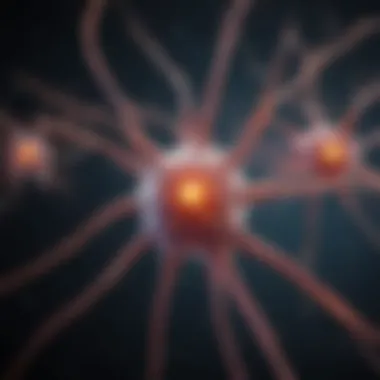
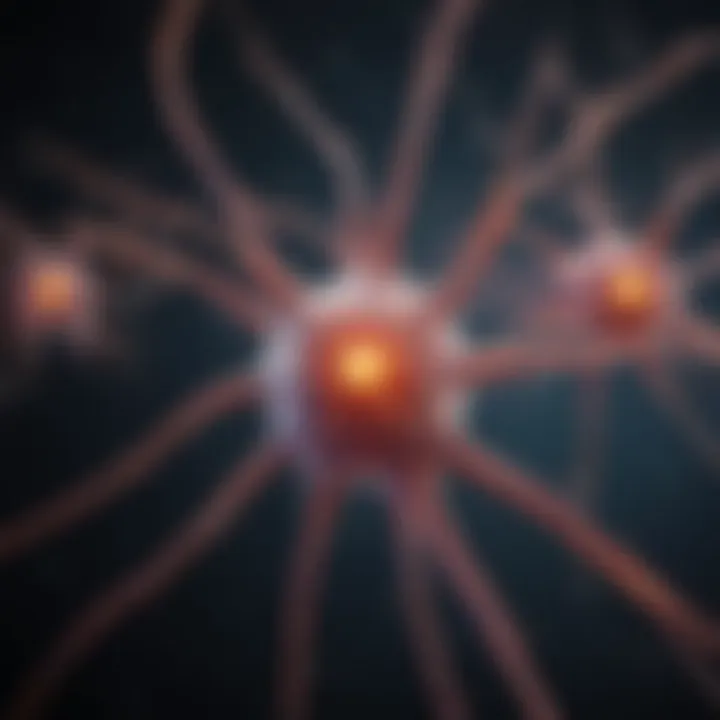
- Cross-reactivity: Some tests may show false positives due to antibodies targeting proteins not exclusive to astrocytes, complicating the diagnosis.
- Sensitivity issues: Certain testing methods might not detect low antibody concentrations effectively. This can lead to negative results despite the presence of clinically relevant antibodies.
- Interpretation challenges: The overwhelming presence of multiple antibodies complicates the diagnostic landscape. Differentiating between antibodies associated with distinct autoimmune disorders requires nuanced clinical judgment and often more specific testing methodologies.
- Delay in diagnosis: As many testing protocols can take time, this can result in delays in treatment and management of the underlying conditions.
Accurate detection and effective diagnosis are fundamental in addressing neurological diseases tied to astrocyte antibodies. Continuous refinement of these testing methods will play a vital role in enhancing diagnostic accuracy.
Understanding these limitations and possibilities allows for better approaches in research and clinical practice. It opens avenues for the development of more reliable and efficient diagnostic tools, ultimately improving patient care.
Research Directions and Future Prospects
Understanding the role of astrocyte antibodies in neuroimmunology opens many avenues for future research. Investigating the interactions between these antibodies and the central nervous system could yield significant insights into existing and emerging neurological disorders. The exploration of astrocytic functions and their connection to immune pathways is essential in grasping the larger picture of neurological health.
In recent years, the focus has shifted towards targeted therapies aimed at astrocytes. With increasing evidence pointing to the beneficial roles of astrocyte antibodies, research must establish how these can be harnessed therapeutically. This could mean developing drugs that enhance astrocytic function or reducing the impact of harmful antibodies. Understanding the mechanisms by which therapies influence astrocyte behavior may lead to substantial advancements in treatment options.
The research directions also highlight the importance of interdisciplinary approaches. Collaborations between immunologists, neurologists, and pharmacologists can lead to a more profound understanding of how astrocytes modulate immune responses. This collective knowledge will benefit the research community and lead to the betterment of patient care.
Moreover, organizations and institutions must increase their focus on funding initiatives related to astrocyte research. This support is crucial for advancing the study of astrocyte antibodies and recognizing their role in neurological conditions.
Emerging Therapeutics Targeting Astrocytes
Current treatments for neurological disorders often target neurons directly, overlooking the supportive roles played by astrocytes. This has prompted renewed interest in developing therapeutics specifically targeting these glial cells. Emerging therapies may include small molecules that regulate astrocyte activity, thereby enhancing their beneficial properties while diminishing harmful effects on neuronal health.
For example, compounds that modulate the release of neurotransmitters from astrocytes show promise in restoring neurological balance in conditions like multiple sclerosis. Another potential avenue lies in gene therapy aimed at modifying astrocyte reactions during inflammation. This proactive approach could lead to significant improvements in disease prognosis.
In addition, immunotherapies targeting astrocytic antibodies could redefine treatment for autoimmune encephalitis. By understanding the specific roles these antibodies play in the disease process, it may be possible to create therapies that directly inhibit their effects. Research must prioritize these pathways to realize the full potential of astrocytic-targeted treatments.
Potential for Biomarker Development
The relationship between astrocyte antibodies and various neurological disorders underscores an important point: their potential as biomarkers. Identifying specific antibody profiles could help diagnose conditions like multiple sclerosis or autoimmune encephalitis earlier and more accurately. This has far-reaching implications not only for treatment but also for understanding disease progression.
Current diagnostic methods often rely on broad criteria. Targeted biomarkers could streamline the diagnostic process, leading to personalized treatment plans. This personalization could improve the overall effectiveness of therapies and enhance patient outcomes.
Moreover, the development of reliable biomarkers could facilitate clinical trials for new treatments. Researchers could monitor how well specific therapies work by observing changes in astrocyte antibody levels. Determining the predictive value of these biomarkers could mean a profound shift in how neurological disorders are managed.
In essence, the exploration of astrocyte antibodies could pave the way for innovative strategies in diagnosing and treating neurological disorders.
Closure
The discussion surrounding astrocyte antibodies is essential in understanding their implications in neuroimmunology. This article highlights the importance of these antibodies in neurological disorders, showing their dual role as both potential harmful agents and useful biomarkers. The involvement of astrocyte antibodies in conditions like autoimmune encephalitis and multiple sclerosis invites deeper research into how these molecules play pivotal roles across various disorders in the central nervous system (CNS).
Summary of Key Points
- Astrocyte Antibodies and CNS Health: Astrocyte antibodies have potential benefits and detrimental effects in human health.
- Role in Autoimmune Disorders: They are critical in various autoimmune disorders, particularly in diagnosing and managing conditions.
- Biomarkers for Neurological Conditions: Their detection could guide therapeutic approaches and improve the understanding of disease progression.
- Implications for Future Treatments: Ongoing research indicates a possible future where therapeutics target pathways involving astrocyte antibodies for better clinical outcomes.
"Understanding astrocyte antibodies is not just an academic exercise; it has real clinical implications in treating neuroinflammatory diseases."
Implications for Future Research
Future research should focus on several key areas to better understand astrocyte antibodies:
- Identifying Mechanistic Pathways: Investigating the mechanisms through which astrocyte antibodies interact with neurons will provide insights into how these antibodies contribute to or mitigate CNS disorders.
- Developing More Specific Diagnostic Tools: Enhanced serological testing and better biomarkers can improve the accuracy and speed of diagnosing astrocyte antibody-related conditions.
- Exploring Therapeutic Options: Research should continue into potential therapeutics that can modulate the effects of astrocyte antibodies, either by enhancing their protective functions or neutralizing their harmful effects.
- Longitudinal Studies on Disease Outcome: Long-term studies tracking patients with detected astrocyte antibodies will help clarify their role in disease progression and response to therapy.
The conclusions drawn from this article underscore the complexity of astrocyte antibodies in neuroimmunology. Their evolving role in various neurological disorders reflects a vital need for ongoing investigation to bridge the gap between basic science and clinical application.















